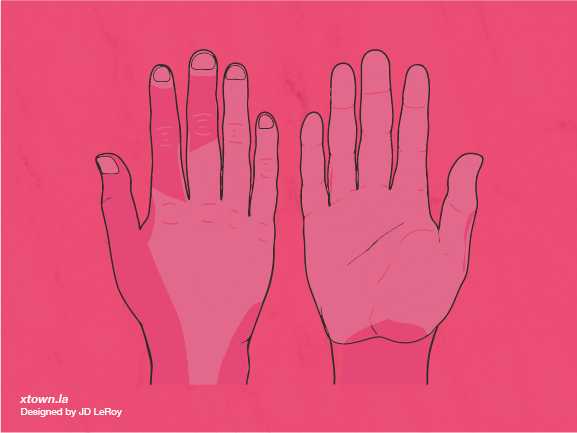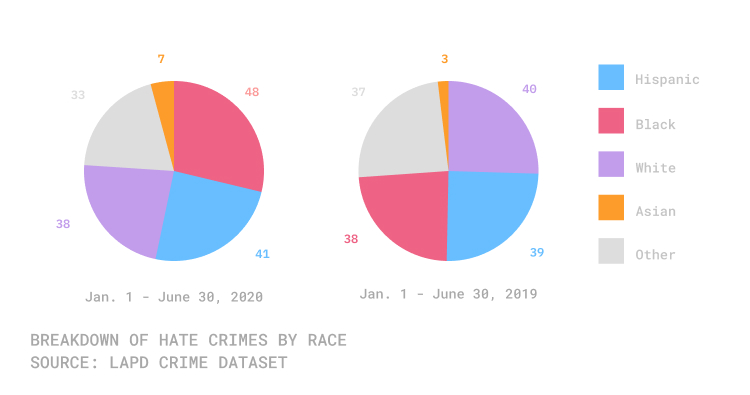Hate crime on the rise during coronavirus

Even as people sheltered in place during the months-long COVID-19 shut down, causing a steep drop in crime across the City of Los Angeles, the number of hate crimes rose by 6% during the first half of the year.
There were 167 hate crimes reported to the Los Angeles Police Department over the fist six months of the year, 10 more than at the same time in 2019. Hate crime has been rising sharply in Los Angeles over the past several years. The LAPD recorded more hate crimes in 2019 than it ever had previously, at 326, a 52% jump from 2015.
The increase this year was directed almost entirely at Black and Asian people. There was a 30% jump in the number of reported hate crimes that targeted Black people during the first six months of 2020. In one case, a 23-year-old Black woman started the first day of the year by being assaulted in a parking lot by a suspect who shouted hate-related anti-Black language and threw an object at her at 10 p.m. in the 7700 block of Melrose Ave. in Fairfax, according to the police record.
Hate crime victims by race

The LAPD defines a hate crime as “any criminal act or attempted criminal act directed against a person or persons based on the victim’s actual or perceived race, nationality, religion, sexual orientation, disability or gender.” These are separate from “hate incidents,” which generally include instances of racially-motivated abuse that do not result in a formal crime report.
Det. Orlando Martinez, the LAPD hate crime coordinator, said calling someone a racial slur would be a hate incident, not a hate crime since there is no legal definition of a hate incident.
Steady increase in hate crimes

Across the county, there has been a sharp increase in threats and hate crimes directed at Asian people, sparked in part by bigotry provoked from the coronavirus pandemic, which saw its first outbreak in China. Asian people across California “have self-reported 832 incidents of discrimination and harassment in the last three months, including 81 incidents of assault and 64 potential civil rights violations,” according to a press release by the Asian Pacific Policy and Planning Council. The release cited President Donald Trump’s repeated use of the term “Kung Flu” at rallies as an example of the discrimination and harassment Asian people face.
In Los Angeles, there were seven reports of hate crimes directed at Asians during the first half of 2020, up from three during the same period last year. In one instance, a 39-year-old Asian man was assaulted while walking down the street at 10:30 am on April 13 in Mid Wilshire. The suspect followed the victim in his car, got out and attacked him with a bottle using hate-laced anti-Asian language.
Russell Jeung, a professor of Asian American Studies at San Francisco State University, and one of the founders of Stop AAPI Hate, said over 80% of the incidents his group tracks are not crimes, but are cases of verbal harassment or discrimination that are not reportable to law enforcement.
“Nonetheless, they are traumatizing cases of hate that should be monitored and addressed,” he said.
Jeung added the City of Los Angeles had nearly 90 reported cases from March 19 – July 1, with the majority of them being verbal discrimination. There were also reports of Asian Americans being coughed or spat on, and being barred from establishments.
Martinez, the LAPD hate crimes coordinator, said he is aware of the history of mistrust the LAPD has with communities of color in Los Angeles and the police are not always the first to be called when a hate crime or incident occurs. He added the increase in reports was due to victims feeling more empowered in light of movements like Me Too and Black Lives Matter, which helped underserved communities ban together to be heard.
“No matter the community, a big part of our investigation when it comes to hate crimes is community outreach,” said Martinez. “I think communities are feeling more empowered to speak up. They may not trust the police, but they believe their voices will be heard more now than in the past.”
Nearly 39% of hate crimes in the first half of this year were for battery simple assault and assault with a deadly weapon, which was roughly in line with this time period last year. Other hate crimes reported to police so far this year included arson, lewd letters or phone calls and a bomb scare.
As the lockdown intensified during the second quarter of the year, the number of hate crimes actually increased by 42% over the first three months of 2020. Hate crimes directed at white people and those who identify as non-binary saw small decreases compared with the same time last year.
Downtown, along with Venice and Mid-City were the top three neighborhoods with reported hate crimes during the first six months of this year. In one example, a 58-year-old white man was attacked by a neighbor at his apartment complex for being gay on June 6 in the 500 block of San Julian Street in Downtown. The police were able to get video surveillance of the battery simple assault and are still investigating.
Martinez said that most hate crimes and incidents are not committed by members of organized racist groups, such as the Proud Boys or the Ku Klux Klan. Martinez also added that about 75% of hate crimes in Los Angeles are committed by minorities due to cultural biases, usually among elder residents.
“It’s our citizens being jerks to each other,” he said.
How we did it: We examined publicly available LAPD data on reported hate crimes in the City of Los Angeles. For neighborhood boundaries, we rely on the borders defined by the Los Angeles Times. Learn more about our data here.
LAPD data only reflects crimes that are reported to the department, not how many crimes actually occurred. In making our calculations, we rely on the data the LAPD makes publicly available.
The LAPD periodically updates past crime reports with new information, leading the department to recategorize past reports. Additionally, revised reports do not always automatically become part of the public database. But, we will keep monitoring hate crimes in the City of Los Angeles.
Want to know how your neighborhood fares? Or simply just interested in our data? Email us at askus@xtown.la.






